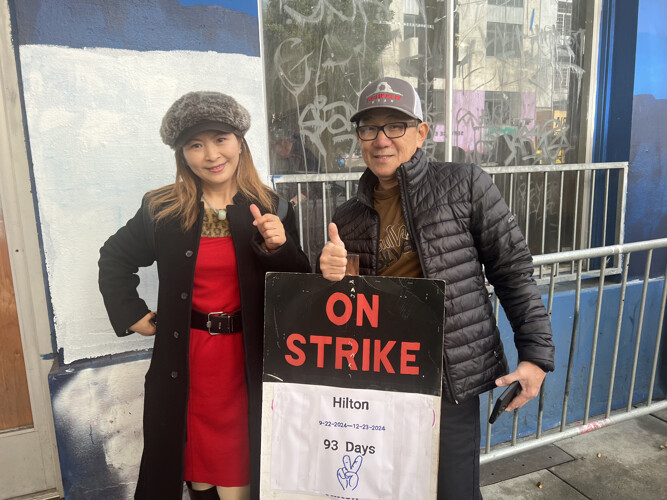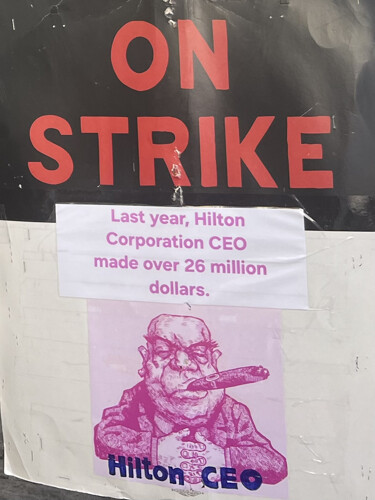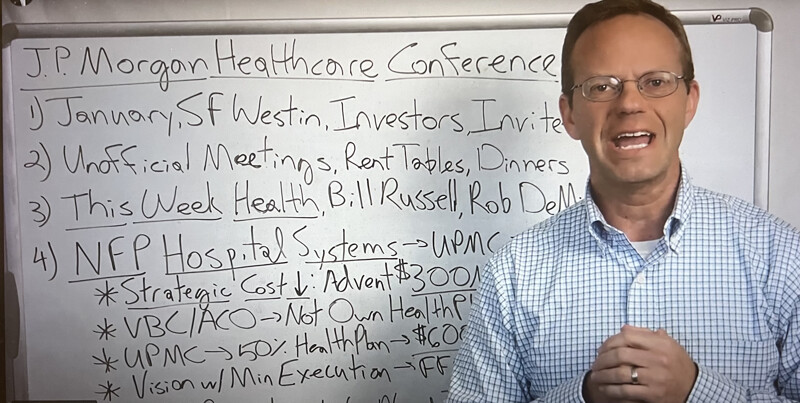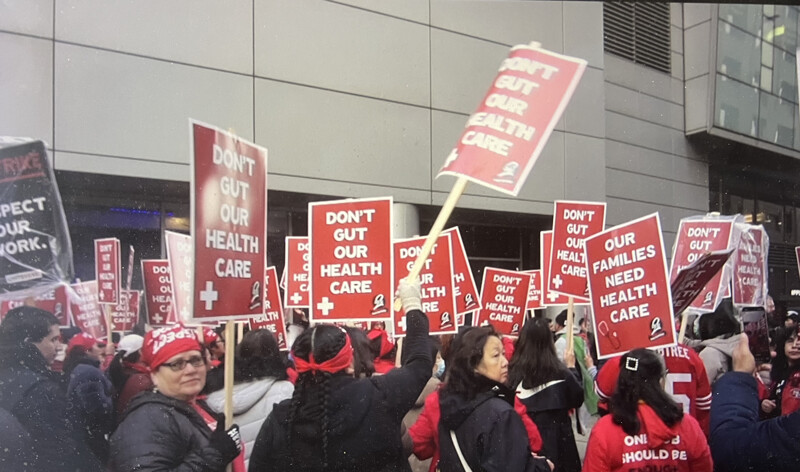From the Open-Publishing Calendar
From the Open-Publishing Newswire
Indybay Feature
SF Unite Here 2 Hotel Workers Win Their Strike for a Contract & Union Healthcare Benefits
San Francisco Unite Here Local 2 Hilton hotel workers went to the union hall to vote on a new proposed contract and talked about their issues on December 24, 2024 after a 93 day strike.
Workers were happy they were able to keep their union healthcare plan and talked about their struggle.
Workers were happy they were able to keep their union healthcare plan and talked about their struggle.

San Francisco Unite Here Local 2 Hilton hotel workers voted and celebrated after a 93 day strike that resulted in the victory of keeping their union healthcare benefits and other union conditions. The hotel workers at the Marriott and Hyatt chain also voted on previous days to accept their new contract and the 2500 striking workers will all be returning to work.
Hilton hotel workers also talked about the proposed contract and what their issues were. J.P. Morgan is having a national healthcare investment conference on January 13 and the new San Francisco Mayor Lurie, the hotel companies and J.P. Morgan were worried that there might be a mass protest against the billionaires who profit from delay, denial and depose on the American people who have capitalist healthcare plans. The union had publicized that they are planning to have a major protest at the St. Francis Marriott where the conference will be held on January 13.
The Hilton, Hyatt and Marriott chains were demanding that the union give up their union healthcare plan and accept their company controlled plans that would have led to a massive rise in their healthcare costs and denial of needed healthcare.
Additional Media:
On Day 81 Of SF Unite HERE Hotel Strike Union Leaders Talk About Issues & The JP Morgan Health Conference
https://youtu.be/t5ZPlE5g7hw
UNITE HERE Hotel Workers Call on J.P. Morgan to Cancel 2025 Healthcare Conference in San Francisco as Strikes Affect 27.5% of City's Hotel Rooms
https://www.businesswire.com/news/home/20241209218007/en/UNITE-HERE-Hotel-Workers-Call-on-J.P.-Morgan-to-Cancel-2025-Healthcare-Conference-in-San-Francisco-as-Strikes-Affect-27.5-of-Citys-Hotel-Rooms
Union Power On 2024 Thanksgiving Day In SF Where UNITE HERE 2 Hotel Workers Continue Their Strike
https://youtu.be/4lIUEhd8J6s
SF Unite HERE Local 2 Hotel Workers Strike Marriott Marquis & Strike Now Expands To 2,000 Workers
https://youtu.be/PvQg-6cvTW8
Unite HERE Local 2 Striking SF Hilton Hotel Workers Speak Out About Their Strike and Issues
https://youtu.be/RqaL4oEkP1k
Unite Here "Choose Healthcare Or Wages" Marriott Bosses Tell SF Unite Here Local 2 Hotel Workers
https://youtu.be/3JD-LuRvnYI
As Workers Rise Up During “Striketober,” 10,000 Hospitality Workers March, Picket, Vote to Unionize, and More in Fight for Good Jobs
https://unitehere.org/press-releases/as-workers-rise-up-during-striketober-10000-hospitality-workers-march-picket-vote-to-unionize-and-more-in-fight-for-good-jobs/
"We Are Getting Stronger" SF Unite Here Marriott Marquis Workers Joined By Teachers On Day 56
https://www.youtube.com/watch?v=GAOoShV_NUc&t=12s
SF Marriott Workers Strike: A Class Battle For All Workers
https://youtu.be/R8M0mrxJpxA
Thousands March In SF For Marriott Hotel Workers
https://www.youtube.com/watch?v=ZZ5TCuSIYL0&t=8s
Billionaires Pay Up! SF Unite HERE Local 2 Bohemian Club Workers Fight For Living Wage
https://www.youtube.com/watch?v=zsEyvHK4X1U
Stop Attacking Unite Here Local 2 SF AT&T Ballpark Centerplate Workers-Workers Vote To Strike
https://www.youtube.com/watch?v=cZYQ_-pf4aE
Oakland Airport Unite Here 2850 Fast Food Workers Fight Union Busting
https://www.youtube.com/watch?v=0-BarHDMqR8
The ZIM'S HERE Local 2 San Francisco Workers Shut It Down
https://www.youtube.com/watch?v=VI8orA3Cg0o
SF Unite-Here Local 2 Hotel Workers Rally & March On Expiration Of Their 2009 Contract
https://www.youtube.com/watch?v=X7xHpTBiT6M
SF 2014 Labor Day March Picket Union Busting Fisherman Wharf Hyatt and Radisson Hotels
https://www.youtube.com/watch?v=6zCAL0ELEW8
35th Anniversary of the 1980 San Francisco Unite Here Local 2 Hotel Strike
https://www.youtube.com/watch?v=u622q87NDR0
SF HERE Local 2 Hotel Workers Shut It Down In 1980 "Union Town”
https://www.youtube.com/watch?v=p_0cY8XIKXE
For More Information:
San Francisco Hotel Workers are On Strike! Cancel the 2025 J.P. Morgan Healthcare Conference in San Francisco!
https://unitehere.org/cancel-2025-jp-morgan-healthcare-conference-in-sf
Production of Labor Video Project
http://www.labormedia.net
What the Health Care Sector Was Selling at the J.P. Morgan Confab
https://kffhealthnews.org/news/article/jpmorgan-health-care-conference-investors-pitches/#:~:text=SAN%20FRANCISCO%20—%20Every%20year%2C%20thousandscan%20be%20republished%20for%20free.
By Molly Castle Work and Arthur Allen
JANUARY 22, 2024
An illustration of a doctor's sthethoscope stretching into a dollar sign shape.
(E+/GETTY IMAGES)
SAN FRANCISCO — Every year, thousands of bankers, venture capitalists, private equity investors, and other moneybags flock to San Francisco’s Union Square to pursue deals. Scores of security guards keep the homeless, the snoops, and the patent-stealers at bay, while the dealmakers pack into the cramped Westin St. Francis hotel and its surrounds to meet with cash-hungry executives from biotech and other health care companies. After a few years of pandemic slack, the 2024 J.P. Morgan Healthcare Conference regained its full vigor, drawing 8,304 attendees in early January to talk science, medicine, and, especially, money.
Are you covered by Medi-Cal?
We want to hear about your experiences and, with your permission, may incorporate your story into our coverage. Please tell us what it has been like for you as you have sought and received care, including the good and the bad, the obstacles and the successes.
SHARE YOUR STORY
1. Artificial Intelligence: Revolutionary or Not?
Of the 624 companies that pitched at the four-day conference, the biggest overflow crowd may have belonged to Nvidia, which unlike the others isn’t a health care company. Nvidia makes the silicon chips whose computing power, when paired with ginormous catalogs of genes, proteins, chemical sequences, and other data, will “revolutionize” drug-making, according to Kimberly Powell, the company’s vice president of health care. Soon, she said, computers will customize drugs as “health care becomes a technology industry.” One might think that such advances could save money, but Powell’s emphasis was on their potential for wealth creation. “The world’s first trillion-dollar drug company is out there somewhere,” she dreamily opined.
Some health care systems are also hyping AI. The Mayo Clinic, for example, highlighted AI’s capacity to improve the accuracy of patient diagnoses. The nonprofit hospital system presented an electrocardiogram algorithm that can predict atrial fibrillation three months before an official diagnosis; another Mayo AI model can detect pancreatic cancer on scans earlier than a provider could, said Matthew Callstrom, chair of radiology at the Mayo Clinic in Rochester, Minnesota.
No one really knows how far — or where — AI will take health care, but Nvidia’s recently announced $100 million deal with Amgen, which has access to 500 million human genomes, made some conference attendees uneasy. If Big Pharma can discover its own drugs, “biotech will disappear,” said Sherif Hanala of Seqens, a contract drug manufacturing company, during a lunch-table chat with KFF Health News and others. Others shrugged off that notion. The first AI algorithms beat clinicians at analyzing radiological scans in 2014. But since that year, “I haven’t seen a single AI company partner with pharma and complete a phase I human clinical trial,” said Alex Zhavoronkov, founder and CEO of Insilico Medicine — one of the companies using AI to do drug development. “Biology is hard.”
EMAIL SIGN-UP
Subscribe to KFF Health News' free Morning Briefing.
Your Email Address
2. Weight Loss Pill Profits and Doubts
With predictions of a $100 billion annual market for GLP-1 agonists, the new class of weight loss drugs, many investors were asking their favorite biotech entrepreneurs whether they had a new Ozempic or Mounjaro in the wings this year, Zhavoronkov noted. In response, he opened his parlays with investors by saying, “I have a very cool product that helps you lose weight and gain muscle.” Then he would hand the person a pair of Insilico Medicine-embossed bicycle racing gloves.
More conventional discussions about the GLP-1s focused on how insurance will cover the current $13,000 annual cost for the estimated 40% of Americans who are obese and might want to go on the drugs. Sarah Emond, president of the Institute for Clinical and Economic Review, which calculates the cost and effectiveness of medical treatments, said that in the United Kingdom the National Health Service began paying in 2022 for obese patients to receive two years of semaglutide — something neither Medicare nor many insurers are covering in the U.S. even now.
But studies show people who go off the drugs typically regain two-thirds of what they lose, said Diana Thiara, medical director for the University of California-San Francisco weight management program. Recent research shows that the use of these drugs for three years reduces the risk of death, heart attack, and stroke in non-diabetic overweight patients. To do right by them, the U.S. health care system will have to reckon with the need for long-term use, she said. “I’ve never heard an insurer say, ‘After two years of treating this diabetes, I hope you’re finished,’” she said. “Is there a bias against those with obesity?”
3. Spotlight on Tax-Exempt Hospitals
Nonprofit hospitals showed off their investment appeal at the conference. Fifteen health systems representing major players across the country touted their value and the audience was intrigued: When headliners like the Mayo Clinic and the Cleveland Clinic took the stage, chairs were filled, and late arrivals crowded in the back of the room.
These hospitals, which are supposed to provide community benefits in exchange for not paying taxes, were eager to demonstrate financial stability and showcase money-making mechanisms besides patient care — they call it “revenue diversification.” PowerPoints skimmed through recent operating losses and lingered on the hospital systems’ vast cash reserves, expansion plans, and for-profit partnerships to commercialize research discoveries.
At Mass General Brigham, such research has led to the development of 36 drugs currently in clinical trials, according to the hospital’s presentation. The Boston-based health system, which has $4 billion in committed research funding, said its findings have led to the formation of more than 300 companies in the past decade.
Hospital executives thanked existing bondholders and welcomed new investors.
“For those of you who hold our debt, taxable and tax-exempt, thank you,” John Mordach, chief financial officer of Jefferson Health, a health system in Pennsylvania and New Jersey. “For those who don’t, I think we’re a great, undervalued investment, and we get a great return.”
Other nonprofit hospitals talked up institutes to draw new patients and expand into lucrative territories. Sutter Health, based in California, said it plans to add 30 facilities in attractive markets across Northern California in the next three years. It expanded to the Central Coast in October after acquiring the Sansum Clinic.
4. Money From New — And Old — Treatments for Autoimmune Disease
Autoimmunity drugs, which earn the industry $200 billion globally each year, were another hot theme, with various companies talking up development programs aimed at using current cancer drug platforms to create remedies for conditions like lupus and rheumatoid arthritis. AbbVie, which has led the sector with its $200 billion Humira, the world’s best-selling drug, had pride of place at the conference with a presentation in the hotel’s 10,000-square-foot Grand Ballroom.
President Robert Michael crowed about the company’s newer autoimmune drugs, Skyrizi and Rinvoq, and bragged that sales of two-decades-old Humira were going “better than anticipated.” Although nine biosimilar — essentially, generic — versions of the drug, adalimumab, entered the market last year, AbbVie expects to earn more than $7 billion on Humira this year since the “vast majority” of patients will remain on the market leader.
In its own presentation, biosimilar-maker Coherus BioSciences conceded that sales of Yusimry, its Humira knockoff listed at one-seventh the price of the original, would be flat until 2025, when Medicare changes take effect that could push health plans toward using cheaper drugs.
Biosimilars could save the U.S. health care system $100 billion a year, said Stefan Glombitza, CEO of Munich-based Formycon, another biosimilar-maker, but there are challenges since each biosimilar costs $150 million to $250 million to develop. Seeing nine companies enter the market to challenge Humira “was shocking,” he said. “I don’t think this will happen again.”
This article was produced by KFF Health News, which publishes California Healthline, an editorially independent service of the California Health Care Foundation.
Molly Castle Work: mwork [at] kff.org, @mollycastlework
Arthur Allen: aallen [at] kff.org, @ArthurAllen202
Hilton hotel workers also talked about the proposed contract and what their issues were. J.P. Morgan is having a national healthcare investment conference on January 13 and the new San Francisco Mayor Lurie, the hotel companies and J.P. Morgan were worried that there might be a mass protest against the billionaires who profit from delay, denial and depose on the American people who have capitalist healthcare plans. The union had publicized that they are planning to have a major protest at the St. Francis Marriott where the conference will be held on January 13.
The Hilton, Hyatt and Marriott chains were demanding that the union give up their union healthcare plan and accept their company controlled plans that would have led to a massive rise in their healthcare costs and denial of needed healthcare.
Additional Media:
On Day 81 Of SF Unite HERE Hotel Strike Union Leaders Talk About Issues & The JP Morgan Health Conference
https://youtu.be/t5ZPlE5g7hw
UNITE HERE Hotel Workers Call on J.P. Morgan to Cancel 2025 Healthcare Conference in San Francisco as Strikes Affect 27.5% of City's Hotel Rooms
https://www.businesswire.com/news/home/20241209218007/en/UNITE-HERE-Hotel-Workers-Call-on-J.P.-Morgan-to-Cancel-2025-Healthcare-Conference-in-San-Francisco-as-Strikes-Affect-27.5-of-Citys-Hotel-Rooms
Union Power On 2024 Thanksgiving Day In SF Where UNITE HERE 2 Hotel Workers Continue Their Strike
https://youtu.be/4lIUEhd8J6s
SF Unite HERE Local 2 Hotel Workers Strike Marriott Marquis & Strike Now Expands To 2,000 Workers
https://youtu.be/PvQg-6cvTW8
Unite HERE Local 2 Striking SF Hilton Hotel Workers Speak Out About Their Strike and Issues
https://youtu.be/RqaL4oEkP1k
Unite Here "Choose Healthcare Or Wages" Marriott Bosses Tell SF Unite Here Local 2 Hotel Workers
https://youtu.be/3JD-LuRvnYI
As Workers Rise Up During “Striketober,” 10,000 Hospitality Workers March, Picket, Vote to Unionize, and More in Fight for Good Jobs
https://unitehere.org/press-releases/as-workers-rise-up-during-striketober-10000-hospitality-workers-march-picket-vote-to-unionize-and-more-in-fight-for-good-jobs/
"We Are Getting Stronger" SF Unite Here Marriott Marquis Workers Joined By Teachers On Day 56
https://www.youtube.com/watch?v=GAOoShV_NUc&t=12s
SF Marriott Workers Strike: A Class Battle For All Workers
https://youtu.be/R8M0mrxJpxA
Thousands March In SF For Marriott Hotel Workers
https://www.youtube.com/watch?v=ZZ5TCuSIYL0&t=8s
Billionaires Pay Up! SF Unite HERE Local 2 Bohemian Club Workers Fight For Living Wage
https://www.youtube.com/watch?v=zsEyvHK4X1U
Stop Attacking Unite Here Local 2 SF AT&T Ballpark Centerplate Workers-Workers Vote To Strike
https://www.youtube.com/watch?v=cZYQ_-pf4aE
Oakland Airport Unite Here 2850 Fast Food Workers Fight Union Busting
https://www.youtube.com/watch?v=0-BarHDMqR8
The ZIM'S HERE Local 2 San Francisco Workers Shut It Down
https://www.youtube.com/watch?v=VI8orA3Cg0o
SF Unite-Here Local 2 Hotel Workers Rally & March On Expiration Of Their 2009 Contract
https://www.youtube.com/watch?v=X7xHpTBiT6M
SF 2014 Labor Day March Picket Union Busting Fisherman Wharf Hyatt and Radisson Hotels
https://www.youtube.com/watch?v=6zCAL0ELEW8
35th Anniversary of the 1980 San Francisco Unite Here Local 2 Hotel Strike
https://www.youtube.com/watch?v=u622q87NDR0
SF HERE Local 2 Hotel Workers Shut It Down In 1980 "Union Town”
https://www.youtube.com/watch?v=p_0cY8XIKXE
For More Information:
San Francisco Hotel Workers are On Strike! Cancel the 2025 J.P. Morgan Healthcare Conference in San Francisco!
https://unitehere.org/cancel-2025-jp-morgan-healthcare-conference-in-sf
Production of Labor Video Project
http://www.labormedia.net
What the Health Care Sector Was Selling at the J.P. Morgan Confab
https://kffhealthnews.org/news/article/jpmorgan-health-care-conference-investors-pitches/#:~:text=SAN%20FRANCISCO%20—%20Every%20year%2C%20thousandscan%20be%20republished%20for%20free.
By Molly Castle Work and Arthur Allen
JANUARY 22, 2024
An illustration of a doctor's sthethoscope stretching into a dollar sign shape.
(E+/GETTY IMAGES)
SAN FRANCISCO — Every year, thousands of bankers, venture capitalists, private equity investors, and other moneybags flock to San Francisco’s Union Square to pursue deals. Scores of security guards keep the homeless, the snoops, and the patent-stealers at bay, while the dealmakers pack into the cramped Westin St. Francis hotel and its surrounds to meet with cash-hungry executives from biotech and other health care companies. After a few years of pandemic slack, the 2024 J.P. Morgan Healthcare Conference regained its full vigor, drawing 8,304 attendees in early January to talk science, medicine, and, especially, money.
Are you covered by Medi-Cal?
We want to hear about your experiences and, with your permission, may incorporate your story into our coverage. Please tell us what it has been like for you as you have sought and received care, including the good and the bad, the obstacles and the successes.
SHARE YOUR STORY
1. Artificial Intelligence: Revolutionary or Not?
Of the 624 companies that pitched at the four-day conference, the biggest overflow crowd may have belonged to Nvidia, which unlike the others isn’t a health care company. Nvidia makes the silicon chips whose computing power, when paired with ginormous catalogs of genes, proteins, chemical sequences, and other data, will “revolutionize” drug-making, according to Kimberly Powell, the company’s vice president of health care. Soon, she said, computers will customize drugs as “health care becomes a technology industry.” One might think that such advances could save money, but Powell’s emphasis was on their potential for wealth creation. “The world’s first trillion-dollar drug company is out there somewhere,” she dreamily opined.
Some health care systems are also hyping AI. The Mayo Clinic, for example, highlighted AI’s capacity to improve the accuracy of patient diagnoses. The nonprofit hospital system presented an electrocardiogram algorithm that can predict atrial fibrillation three months before an official diagnosis; another Mayo AI model can detect pancreatic cancer on scans earlier than a provider could, said Matthew Callstrom, chair of radiology at the Mayo Clinic in Rochester, Minnesota.
No one really knows how far — or where — AI will take health care, but Nvidia’s recently announced $100 million deal with Amgen, which has access to 500 million human genomes, made some conference attendees uneasy. If Big Pharma can discover its own drugs, “biotech will disappear,” said Sherif Hanala of Seqens, a contract drug manufacturing company, during a lunch-table chat with KFF Health News and others. Others shrugged off that notion. The first AI algorithms beat clinicians at analyzing radiological scans in 2014. But since that year, “I haven’t seen a single AI company partner with pharma and complete a phase I human clinical trial,” said Alex Zhavoronkov, founder and CEO of Insilico Medicine — one of the companies using AI to do drug development. “Biology is hard.”
EMAIL SIGN-UP
Subscribe to KFF Health News' free Morning Briefing.
Your Email Address
2. Weight Loss Pill Profits and Doubts
With predictions of a $100 billion annual market for GLP-1 agonists, the new class of weight loss drugs, many investors were asking their favorite biotech entrepreneurs whether they had a new Ozempic or Mounjaro in the wings this year, Zhavoronkov noted. In response, he opened his parlays with investors by saying, “I have a very cool product that helps you lose weight and gain muscle.” Then he would hand the person a pair of Insilico Medicine-embossed bicycle racing gloves.
More conventional discussions about the GLP-1s focused on how insurance will cover the current $13,000 annual cost for the estimated 40% of Americans who are obese and might want to go on the drugs. Sarah Emond, president of the Institute for Clinical and Economic Review, which calculates the cost and effectiveness of medical treatments, said that in the United Kingdom the National Health Service began paying in 2022 for obese patients to receive two years of semaglutide — something neither Medicare nor many insurers are covering in the U.S. even now.
But studies show people who go off the drugs typically regain two-thirds of what they lose, said Diana Thiara, medical director for the University of California-San Francisco weight management program. Recent research shows that the use of these drugs for three years reduces the risk of death, heart attack, and stroke in non-diabetic overweight patients. To do right by them, the U.S. health care system will have to reckon with the need for long-term use, she said. “I’ve never heard an insurer say, ‘After two years of treating this diabetes, I hope you’re finished,’” she said. “Is there a bias against those with obesity?”
3. Spotlight on Tax-Exempt Hospitals
Nonprofit hospitals showed off their investment appeal at the conference. Fifteen health systems representing major players across the country touted their value and the audience was intrigued: When headliners like the Mayo Clinic and the Cleveland Clinic took the stage, chairs were filled, and late arrivals crowded in the back of the room.
These hospitals, which are supposed to provide community benefits in exchange for not paying taxes, were eager to demonstrate financial stability and showcase money-making mechanisms besides patient care — they call it “revenue diversification.” PowerPoints skimmed through recent operating losses and lingered on the hospital systems’ vast cash reserves, expansion plans, and for-profit partnerships to commercialize research discoveries.
At Mass General Brigham, such research has led to the development of 36 drugs currently in clinical trials, according to the hospital’s presentation. The Boston-based health system, which has $4 billion in committed research funding, said its findings have led to the formation of more than 300 companies in the past decade.
Hospital executives thanked existing bondholders and welcomed new investors.
“For those of you who hold our debt, taxable and tax-exempt, thank you,” John Mordach, chief financial officer of Jefferson Health, a health system in Pennsylvania and New Jersey. “For those who don’t, I think we’re a great, undervalued investment, and we get a great return.”
Other nonprofit hospitals talked up institutes to draw new patients and expand into lucrative territories. Sutter Health, based in California, said it plans to add 30 facilities in attractive markets across Northern California in the next three years. It expanded to the Central Coast in October after acquiring the Sansum Clinic.
4. Money From New — And Old — Treatments for Autoimmune Disease
Autoimmunity drugs, which earn the industry $200 billion globally each year, were another hot theme, with various companies talking up development programs aimed at using current cancer drug platforms to create remedies for conditions like lupus and rheumatoid arthritis. AbbVie, which has led the sector with its $200 billion Humira, the world’s best-selling drug, had pride of place at the conference with a presentation in the hotel’s 10,000-square-foot Grand Ballroom.
President Robert Michael crowed about the company’s newer autoimmune drugs, Skyrizi and Rinvoq, and bragged that sales of two-decades-old Humira were going “better than anticipated.” Although nine biosimilar — essentially, generic — versions of the drug, adalimumab, entered the market last year, AbbVie expects to earn more than $7 billion on Humira this year since the “vast majority” of patients will remain on the market leader.
In its own presentation, biosimilar-maker Coherus BioSciences conceded that sales of Yusimry, its Humira knockoff listed at one-seventh the price of the original, would be flat until 2025, when Medicare changes take effect that could push health plans toward using cheaper drugs.
Biosimilars could save the U.S. health care system $100 billion a year, said Stefan Glombitza, CEO of Munich-based Formycon, another biosimilar-maker, but there are challenges since each biosimilar costs $150 million to $250 million to develop. Seeing nine companies enter the market to challenge Humira “was shocking,” he said. “I don’t think this will happen again.”
This article was produced by KFF Health News, which publishes California Healthline, an editorially independent service of the California Health Care Foundation.
Molly Castle Work: mwork [at] kff.org, @mollycastlework
Arthur Allen: aallen [at] kff.org, @ArthurAllen202
For more information:
https://youtu.be/9tsj7EspE9E
Add Your Comments
We are 100% volunteer and depend on your participation to sustain our efforts!
Get Involved
If you'd like to help with maintaining or developing the website, contact us.
Publish
Publish your stories and upcoming events on Indybay.
Topics
More
Search Indybay's Archives
Advanced Search
►
▼
IMC Network








